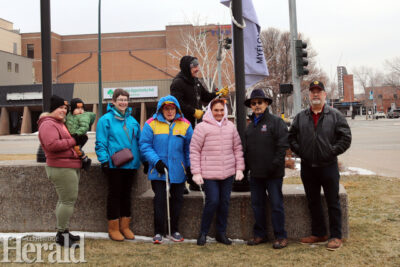Ceremony raises awareness about multiple myeloma
By Alejandra Pulido-Guzman - Lethbridge Herald on March 2, 2024.
 Herald photo by Alejandra Pulido-Guzman
Members of the multiple myeloma Lethbridge support group raise their flag to kick off myeloma awareness month Friday at City Hall.
Herald photo by Alejandra Pulido-Guzman
Members of the multiple myeloma Lethbridge support group raise their flag to kick off myeloma awareness month Friday at City Hall.LETHBRIDGE HERALDapulido@lethbridgeherald.com
With March marking Multiple Myeloma Awareness Month, a local support group for those dealing with the disease has raised their flag at City Hall to bring attention to it.
Myeloma Canada Lethbridge support group leader Brian Treadwell spoke shortly after the flag was raised.
“Here in Lethbridge, we had a flag raising ceremony to get Albertans and here specifically in Lethbridge to be more aware of what myeloma is. It’s still considered a rare disease but it’s the second most common blood cancer,” said Treadwell.
 He said according to their latest statistics from 2022, there are 4,000 Canadians diagnosed with myeloma annually, with 11 diagnosed daily across the country.
 “Here, 11 are diagnosed annually in southern Alberta so it’s still rare, and that 11 comes from the oncologists here at the Jack Ady Cancer Centre,” said Treadwell.
 He said one of the reasons raising awareness about the disease vital is because people are not sure what myeloma is, and a lot of times the symptoms are vague.
 “It’s unexplained problems they have, maybe they have anemia, fatigue, maybe they have unexplained bone lesions or problems with stiffness, there are so many different reasons why people get myeloma and there’s no known cure, there’s no known cause,” said Treadwell.
 He said because the symptoms are so vague, people often go months and even years not knowing that they have myeloma.
 “The sooner they get in and get those problems that they have addressed, not only by their doctor but getting a referral to a hematologist, that’s when they’ll get through a whole battery of tests and hopefully a diagnosis will come back to answer their questions,” said Treadwell.
 He said even though there is no cure for myeloma at this time, treatments exist that are allowing people to live for decades after diagnosis, when before they may only would have lived a handful of years at best.
“Cancer, it’s a smart animal, the thing is once you have myeloma you’ll go through a set of treatment and then the cancer becomes sort of used to it.”
 Treadwell explained that he calls cancer a smart animal because it seems to adapt to every treatment until the point where patients tried all that are available and then run out of options.
 “At that point you become relapsed or refractory and then you have to look around and find out where there are drug trials, those aren’t prescribed by Health Canada, so you have to go and get drug trials,” said Treadwell.
 He said luckily enough in Alberta the University of Calgary is a world class leader in drug trials and many cancer patients, including those with myeloma, can take part.
One of those patients is Lisa Mack, who said she has been in remission for three years thanks to it.
“I said the other day I’m a 15-year multiple myeloma veteran. I’ve gone through two stem cell transplants, various chemo and three years ago I was on palliative care because after all those years I said that’s enough,” said Mack.
She shared that at that point the multiple myeloma bone marrow had the cancer gone out of control and when her doctor wanted to put her back on chemo she denied.
 “He said OK, but as soon as a trial drug comes up that you qualify for, I have to qualify for simply because of certain medications you may have had before disqualify you for certain trials, so I qualified for this one, I went for it and I’ve been in remission in April will be 3 years,” said Mack.
She said she has a new lease on life and she is planning on getting the best out of it.
And just like Mack, many patients are enjoying a better quality of life and living longer thanks to research, said Treadwell.
 “The treatments are getting better, which means your life is getting better, the quality of life is getting better and the researchers now are using that word ‘cure’ and when you’ve got something that’s incurable and the researchers say you’re going to have a cure soon that gives you hope,” said Treadwell.
 He said things are looking up for people with myeloma, but awareness is still needed, and that is why not only the flag was being raised, but City Hall was also going to be lit up with myeloma red Friday night.
24-23




